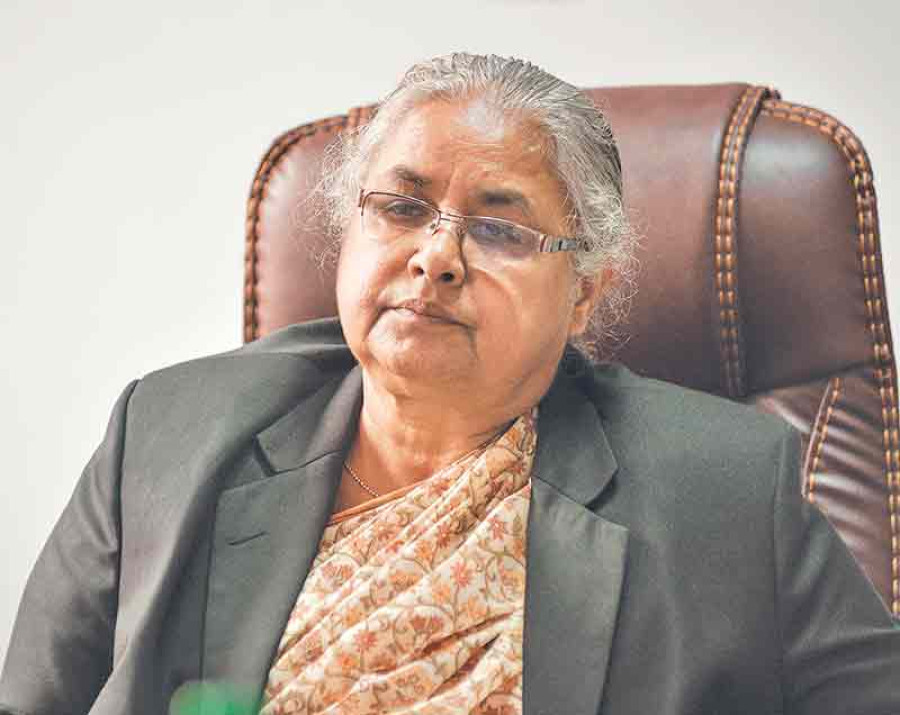Miscellaneous
Justice with conviction
In her 11 months as the 25th chief justice of the country, Sushila Karki created two histories—as the first female chief of the Supreme Court and the first justice to face impeachment in Parliament. Karki, known for her bold decisions, built an impeccable image in the judicial sector both as a lawyer and a justice in the apex court.
Binod Ghimire
In her 11 months as the 25th chief justice of the country, Sushila Karki created two histories—as the first female chief of the Supreme Court and the first justice to face impeachment in Parliament. Karki, known for her bold decisions, built an impeccable image in the judicial sector both as a lawyer and a justice in the apex court.
Born on June 7, 1952 in Biratnagar, Karki studied law before pursuing a career in advocacy on March 29, 1979. In her three decades as lawyer, Karki led the Koshi Zonal Bar and the Biratnagar Appellate Bar twice. Having created her space as a popular lawyer in the East, the government on January 9, 2009 appointed her as a temporary justice of the Supreme Court. Karki became a permanent justice a year later before being appointed the first female member of the Judicial Council on January 6, 2016. Three months later, she became the acting chief justice. She was the first woman to lead the judiciary, coincidently when the president and speaker of the country were also women, though it was only on July 10, 2016 that she got full appointment.
In her eight-year stint at the SC, she has issued many landmark verdicts, mainly against corruption. Her decision to convict sitting minister Jaya Prakash Gupta of corruption in 2012, overturning a 2007 decision taken by a Special Court bench, will always be remembered not just in the judicial but also in the political history of Nepal. This was the first instance of an incumbent minister being sent behind the bars for corruption.
It was also Sushila Karki, together with Bishwambhar Shrestha and Sapana Pradhan-Malla, who decided to reopen the case of appointment of Lokman Singh Karki as the chief of the Commission for Investigation of Abuse of Authority. The case had been scrapped by the same court earlier. Based on the same decision, a full bench of the SC on January 8 last year disqualified Lokman as the CIAA chief citing the lack of moral integrity to lead the constitutional position.
But the last crucial decision of her career dragged her into a controversy, which later became the cause for the parties dissatisfaction with her to initiate the impeachment process. On March 21, 2017, a full bench of Karki and five other justices quashed the government’s decision to appoint DIG Jaya Bahadur Chand as the chief of Nepal Police, claiming that it was an arbitrary and flawed decision.
The ruling became the major bone of contention between the government and the SC, which the former took as a breach of its jurisdiction.
The perception in the government of the judiciary encroaching upon its territory became so intense that lawmakers from the ruling parties resorted to an impeachment motion against her. As many as 249 lawmakers from the Nepali Congress and the CPN (Maoist Centre) registered the impeachment motion against her on April 30 last year, alleging interference in the power of the executive, inefficiency in executing her duties, biased decision-making, and thriving “groupism” in the judiciary. The story did not end here. The SC a week later said the allegations made in the impeachment motion were against the spirit of the constitution.
“She never comprised on her conviction and always faced pressure boldly,” Prakash Osti, former SC justice and a member of the National Human Rights Commission, said, “It’s rare to find such a person in a country like ours.”
—By Binod Ghimire




 23.36°C Kathmandu
23.36°C Kathmandu










